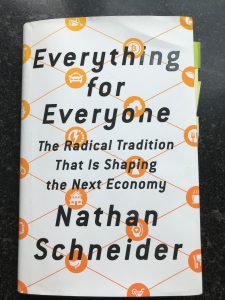
Try to get yourself elected to an EMC board of directors and you’ll become another data point for stories like this one. Heald describes in his piece, how the EMCs rig board elections and maintain an iron grip on power. One “trick” is to control the proxy rules, as he describes essentially as a prize for your proxy:
REC’s [Rappahannock Electric Cooperative] board controls huge numbers of votes each year because proxy ballots left blank are deemed by REC’s board as a delegation of the member-owner’s vote to the incumbent board to decide whom to cast them for. Moreover, REC offers those who send in a proxy, even a blank one, a chance to win cash prizes. That encourages member-owners to submit blank proxies, even if they have no interest in the election or makeup of the board. REC’s election tally forms going back over a decade show that every year REC incumbent board controls enough proxies to control election outcomes. For at least the past twelve years no candidate has won a race without getting the board-controlled votes.
In other words, get more than 2 times the votes from members than any other candidate and you lose unless you’re the board-favored candidate, as was the case here. But that’s not all, nor is it the worst anti-democratic tactic. As Heald continues, saying that a current and nefarious practice of manipulating the by-laws is becoming unnecessary, by virtue of this rule-rigging power grab that a neighboring utility is preparing in order to claim a tie vote as a win for it’s favored candidate:
SVEC’s [Shenandoah Valley Electric Cooperative] board is considering changing its (fair) direct election process next year to a proxy system like REC’s. If SVEC follows through on that, then its board, like REC, will be able to determine election outcomes. That would make SVEC’s new tie-vote bylaw unnecessary. There are no ties when incumbent board members control election outcomes.
SVEC’s board would then be fully insulated from member-owner concerns. That would greatly help incumbent board members, who recently approved major fixed-monthly-charge increases that disproportionately affect the co-op’s low-income member-owners and those who’ve invested in rooftop solar or energy efficiency.[2]
Lets face it, concerning ourselves with the bureaucracy of rules and governance is tedious, boring and complicated, not to mention very time consuming. A growing number of households are more concerned with keeping the lights on in times like these but the erosion of democracy directly relates to increasing precarity. These boards are aware of it and they reproduce their control and power as a result. But when we don’t contest this sort of thing, we get these sorts of shenanigans. The word “cooperative” ceases to have any meaning when things like this happen. Ditto for “democracy” with power production and distribution becoming a site of increasingly undemocratic hanky panky.[3]
Read Seth Heald’s piece, here. I’d bookmark the site too– Powerforthepeopleva.com. He and Ivy Main are on top it!
——
[1] Some previous AIRE posts relevant to cooperatives and the idea of cooperation are here, here, here, and here.
[2] Yes, those fixed charges, or solar punishment taxes are a tremendous threat. It’s a lot like having your vegetable garden at home and having the grocery store charge you a fee just because you shop there sometimes. They punish you for growing your own tomatoes. Or, maybe you can think of it this way; you’re frugal with your power bill, saving what you can by keeping your lights off when possible and such conservation habits, but your power company is charging you for the power you save! Think about that. What a racket. That’s what these utilities are doing. Here’s Ivy Main’s post on that, referenced in Heald’s quote.
[3] This is why I recommend Nathan Schneider’s book whose cover is pictured above. It’s a good look back at the history of the cooperative movement, at how they’ve been co-opted, and a look forward at how they can help people in these times. See this discussion for more on Everything for Everyone.